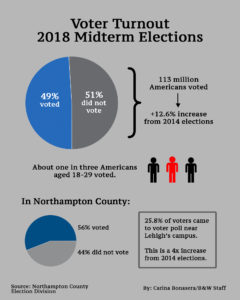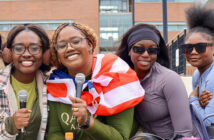 Northampton County election results have been made official, revealing that 865 voters, or 25.8 percent of those registered, casted ballots at the Litzenberger House polling center for the 2018 midterm election on Nov. 6.
Northampton County election results have been made official, revealing that 865 voters, or 25.8 percent of those registered, casted ballots at the Litzenberger House polling center for the 2018 midterm election on Nov. 6.
Voter turnout at the Litzenberger House, which largely services Lehigh student voters, was over four times larger than that of the 2014 midterm elections. In that cycle, 204 voters, or 6.62 percent of those registered, cast their ballots at the polling location.
Voter statistics of Bethlehem’s 3rd Ward, the precinct which Litzenberger House polls, is reflective of the Lehigh student vote because students’ on-campus and some off-campus addresses route them to this location.
However, the statistics are not a direct representation of Lehigh students, some of whom may have voted in their home district or by absentee ballot.
Northampton County as a whole saw a turnout of 56 percent for registered voters in 2018.
In total, 113 million Americans voted this year, which accounts for 49 percent of all eligible voters. This is up from 36.4 percent in the 2014 midterms.
Sara Boyd, ‘21, the president of the Student Political Action Coalition, said more millennials voted this year in response to their concerns about the current government.
“I think a lot of voters in the country were angry with the way that the government no longer looks like them, and as a result, there are more women in Congress than ever, there’s the most diverse Congress ever, there’s the first Native American congresswoman,” she said. “The enthusiasm in politics following Trump’s first two years and all the recent things that have happened in the country overall absolutely have motivated people to get to the polls.”
Vera Fennell, a professor of political science, said the candidates in this year’s race also motivated young people to go out and vote.
“There were attractive candidates, and when people find attractive candidates, they come up and vote,” Fennell said. “They’re convinced that it’s important and that it’s needed and that it could make a change.”
Though millennials are the largest demographic of the electorate, their voter registration and turnout is consistently significantly lower than other groups. The estimated turnout for Lehigh’s polling area is slightly lower than the nationwide turnout for those aged 18 to 29 – about 31 percent.
Brian Fife, a professor and the chair of the political science department, said it is millennials’ perception of themselves that impacts the low turnout rates.
“Young people don’t perceive themselves to be stakeholders,” Fife said. “Middle-aged and older people tend to be homeowners. They tend to be very supportive of programs like Social Security and Medicare, which honestly don’t mean that much to people in their late teens or early twenties. When younger people perceive themselves to be bigger stakeholders, then they will start voting and doing other forms of political participation.”
Another cause for these low turnout rates, Fife said, is the stringent structural laws in the country as a whole.
“Consider Pennsylvania — if you don’t register 30 days before Election Day, you can’t vote,” he said.
Fife said most states have voter registration deadlines similar to that of Pennsylvania. In addition, the fact that Election Day in the United States is only one day — whereas elections in other countries take up several days and might constitute a holiday — is also a barrier.
While a significant portion of the millennial demographic as a whole tends not to vote, Boyd said college students specifically face disadvantages. Many students have no mode of transportation to get to polling locations or cannot find the time to go at all.
“When students perceive even the slightest barrier to voting, it prevents them from doing so,” Boyd said. “If they have a class in an hour, and they’ve heard that the lines are 45 minutes, that to them is a huge barrier so they’re not going to go. If they have an exam the same day, that to them is a huge barrier in their perception and, thus, they don’t go vote. Both of which are things that happened on (Nov. 6).”





Comment policy
Comments posted to The Brown and White website are reviewed by a moderator before being approved. Incendiary speech or harassing language, including comments targeted at individuals, may be deemed unacceptable and not published. Spam and other soliciting will also be declined.
The Brown and White also reserves the right to not publish entirely anonymous comments.